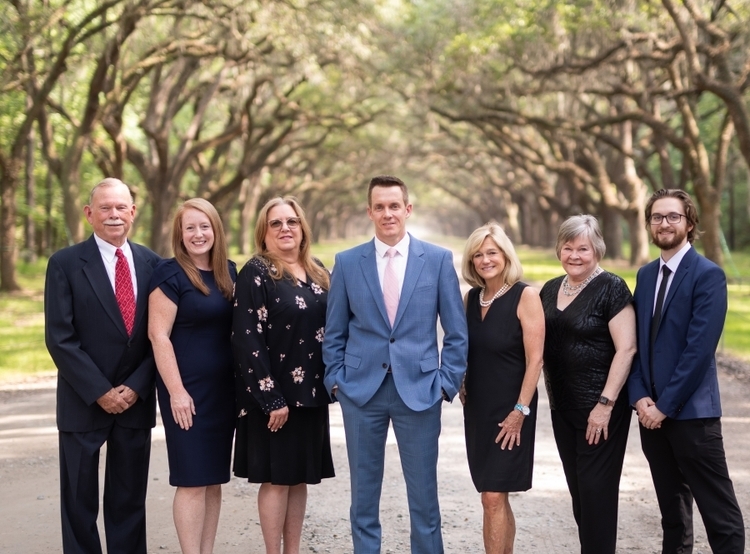Guiding Our Clients To Their Goals
Our team is committed to helping our clients achieve their individual, business, and legacy goals. We build comprehensive investment plans that allow our clients to plan for the expected and unexpected. Below you will find specific scenarios for our clients and how we worked together to attain their specialized goals.
Case Study 1: Retirement Income Planning
Scenario: A seasoned professional wants to start planning for retirement. They anticipate spending $120,000 a year in retirement which they hope to start at age 55. They also want to spend $20,000 a year on travel during their retirement years.
Clements McGovern FCG Approach: We would start by thoroughly examining their income, expenses, and overall financial situation while also making inquiries into any family or legacy goals. Together, we would then create an investment plan that ensures they establish sustainable retirement income while simultaneously funding travel and legacy plans.
Case Study 2: Legacy Planning via Trust
Scenario: A couple approaching retirement has built a successful business over the years and has accumulated a significant amount of wealth. They are now beginning to think about their legacy and want to ensure that their hard-earned assets are passed on to their children and grandchildren in a way that is both tax-efficient and consistent with their values. They have heard about trusts to achieve their legacy planning goals, but they are not familiar with the different types of trusts and how they work. They also have concerns about the tax implications and are curious if setting up a trust will ensure that their assets are managed in a way that will benefit their family for generations to come.
Clements McGovern FCG Approach: Reviewing the couple’s financial situation in conjunction with their vision will help identify if any potential tax implications can be mitigated through legacy planning. Through an in-depth conversation with the couple, we analyze their wishes for their assets while considering the values they want to preserve and pass on to their family. Next, we develop a plan and recommend the most suitable type of trust, such as revocable living trust, irrevocable trust, Spousal Lifetime Access Trusts (SLATs), and irrevocable life insurance trust (ILITs). We would then help them choose a trustee who has the necessary experience and qualifications to manage the trust effectively, including potentially a corporate trustee. As their financial situation evolves, we meet with the couple regularly to review changes in their life strategy and adjust their plan as necessary.
Case Study 3: Business Sale
Scenario: A local business owner is considering retirement in the next couple of years and is contemplating selling their business. The local business owner is exploring the avenues of a potential business sale and is looking for the expertise of an Advisor to assist with the process.
Clements McGovern FCG Approach: We can provide the local business owner with valuable insights into the sale of their business by assessing the business’s financial health, market value, and potential tax implications. Additionally, we can explore multiple offers to help ensure the business owner negotiates the best opportunity. Finally, we can develop a strategic plan that integrates the business sale into an overall retirement and legacy plan that minimizes tax implications and allows the proceeds to be invested to sustain retirement and protect legacy goals.
Case Study 4: Tax-friendly Land Sale
Scenario: A property owner purchased a large plot of vacant land many years ago and now has considerable unrealized gains. They decide that instead of developing the land that they would rather sell it and use the proceeds to invest in a different real-estate property or a more passive real-estate investment. They seek the guidance of a Financial Advisor to explore potential options.
Clements McGovern FCG Approach: Collaboratively, we would discuss the property owner’s financial situation and long-term goals while also considering the potential tax implications of selling the property, specifically the capital gains tax that would be levied on the sale proceeds. To defer capital gains tax liability, we would suggest a 1031 exchange, which is a tax-deferred exchange that allows investors to sell investment property and reinvest the proceeds into another “like-kind” property without incurring capital gains tax. We would help guide the property owner through the process of identifying and acquiring a replacement property, ensuring that the transaction adheres to the strict 1031 exchange requirements. Additionally, for investors desiring a more passive approach, property sale proceeds can be exchanged into professionally managed real estate portfolios available through our team and Wells Fargo Advisors on a tax-deferred basis.
Case Study 5: Special Needs Planning
Scenario: A couple has a child with special needs and is concerned with their child’s well-being after they are no longer able to provide for them. They have heard about special needs trusts (SNTs) as a way to protect their child’s eligibility for government benefits while also providing them with additional financial resources. However, they are unsure about how to set up a SNT and want to make sure they are doing everything they can to ensure their child’s future.
Clements McGovern FCG Approach: First, we would assess the family’s financial situation by reviewing the family’s income, assets, and debts to determine how much they can realistically contribute to the trust. Then, we would explain the pros and cons of various SNTs. We would work with their attorney to draft the trust document and help the family determine the beneficiaries, trustee, and how the trust assets will be managed and distributed. As the child’s needs change and as laws governing SNTs evolve, we would continuously work with their attorney to provide ongoing investment advice and support.
** The solutions discussed may not be appropriate for your personal situation, even if it is similar to the examples presented. Investors should make their own decisions based on their specific investment objectives and financial circumstances. It should not be assumed that the recommendations made in these situations achieved any of the goals mentioned. These examples are hypotheticals and do not represent any specific investments and strategies.
** This information is made available with the understanding that Wells Fargo Advisors and its affiliates are not engaged in rendering legal, accounting, or tax advice. Any discussion of taxes represents general information and is not intended to be, nor should it be construed to be, legal or tax advice. Tax laws or regulations are subject to change at any time and can have substantial impact on an actual client situation.

Continue To: Our Mission
You have seen the "how" now experience the "why" by clicking the button below to learn about our dedication and motivation to our clients.
Our Mission
Meet Our Team
Head over to Our Team page to get to know the friendly faces you will be working with and also find out how to connect with us on LinkedIn and Facebook.
Our Team